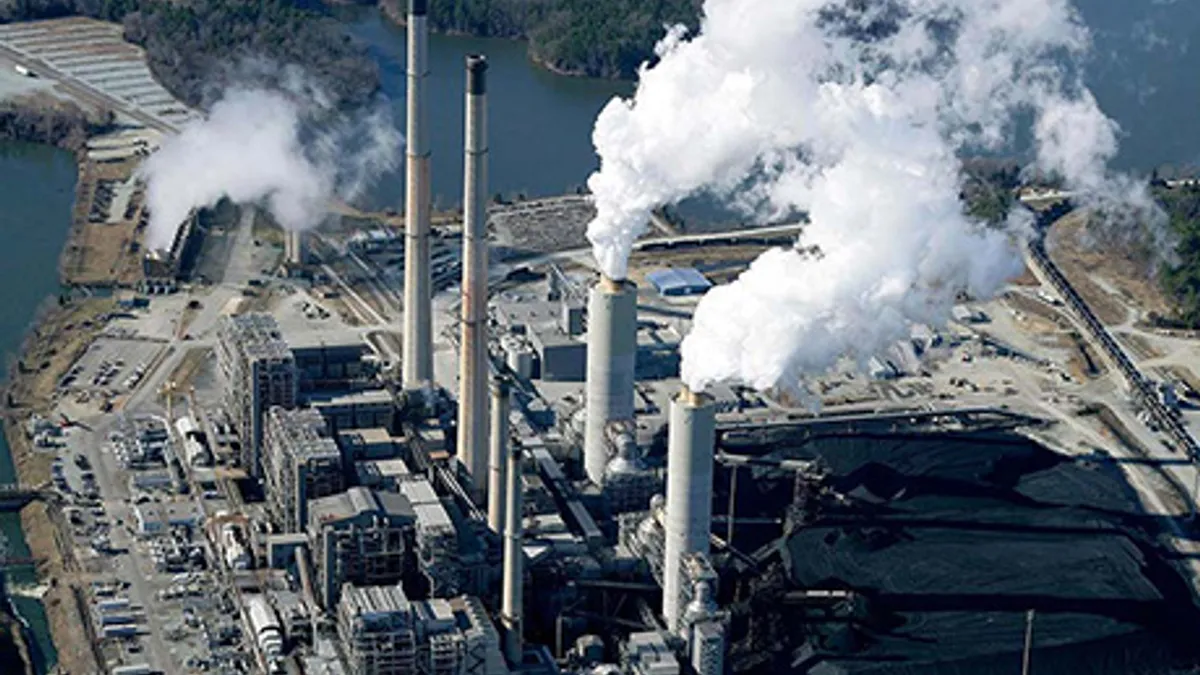Dive Brief:
- A trio of environmental advocates represented by the Southern Environmental Law Center (SELC) told North Carolina regulators last week that Duke Energy's proposed 15-year integrated resource plan (IRP) is too expensive, maintains old and inefficient coal plants, and builds unnecessary gas plants.
- Duke filed its IRP last year with the North Carolina Utilities Commission (NCUC), calling for new gas and solar resources. The utility wants to add 9,534 MW of gas capacity by 2033, and 3,671 MW of solar capacity across the same timeline.
- The North Carolina Attorney General’s Office also weighed in, arguing that the utility's modeling should test a "wider range of storage technologies paired with renewable energy" while also taking into account the costs to ratepayers from climate change caused by gas-fired generation.
Dive Insight:
Duke says it is making progress cleaning up its energy mix. The utility has already retired 30 coal units in the Carolinas and five others have shutdown dates.
According to spokesman Randy Wheeless, the utility will have six coal-fired plants in operation in North Carolina after the retirement of the Asheville Plant this year "We're moving in the direction of a cleaner energy environment for North Carolina," he told Utility Dive.
Duke is "confident in our IRP and the analysis that went into it," he said.
But critics say the utility is not moving fast enough and should be considering a wider range of resources.
"We're asking the [NCUC] to take a hard look at Duke Energy's long-range plans," SELC Senior Attorney Gudrun Thompson said in a statement.
SELC filed comments with North Carolina regulators March 7 on behalf of the Sierra Club, Natural Resources Defense Council and the Southern Alliance for Clean Energy. The groups have asked the commission to hold a trial-type evidentiary hearing on the utility's IRP to consider the plans "before Duke Energy goes farther down the path toward imprudent investments in expensive, unnecessary gas-fired generation."
The groups say a resource portfolio with higher levels of energy efficiency, solar and wind "could save ratepayers billions of dollars over the planning horizon with the added benefit of reduced air pollution from gas- and coal-fired power plants."
While also asking for greater consideration of renewables and storage, the state's attorney general also said Duke's planning should consider the climate cost of gas-fired generation.
"Climate change has real costs that are ultimately borne by ratepayers," the Attorney General's Office told the utilities commission.
On this point, Wheeless said the absence of a price on carbon emissions makes it tough to compare the environmental costs of some proposals.
"Without some sort of price on carbon, it's tough for us to say," said Wheeless.
The utility is also taking innovative approaches to clean energy investment: Last week, Duke Energy Progress completed issuance of $600 million in green bonds that the utility says will finance eligible green energy projects. Those include the development, construction and procurement of solar generation in the Carolinas.
Duke said it is the second green bond transaction by one of its utilities. Duke Energy Carolinas issued $1 billion of green bonds in November.
Correction: An earlier version misstated the number of coal units Duke has shuttered in the Carolinas.














